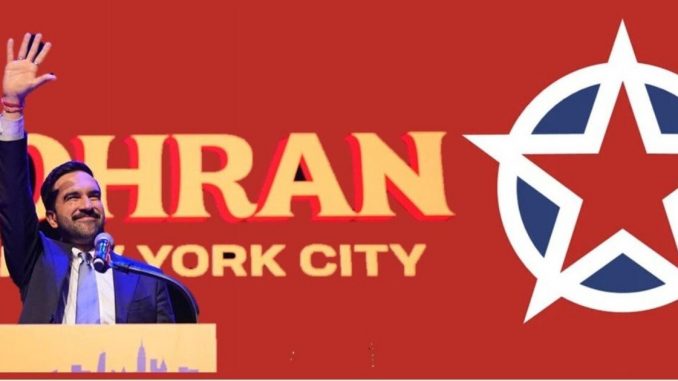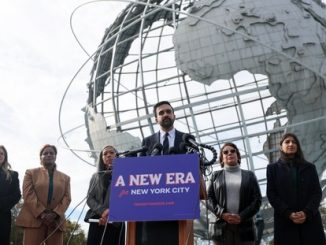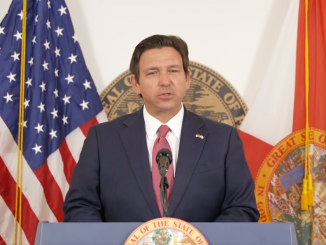
Published November 9, 2025
When Queens Assemblyman Zohran Mamdani unveiled his sweeping socialist agenda for New York City, he framed it as a moral crusade — a plan to “lift working families” and “end corporate greed.”
But critics say his vision is less about fairness and more about control — a government-first experiment that could turn the nation’s economic capital into a cautionary tale of overreach and decline.
A City-Owned Economy?
Mamdani’s platform reads like a socialist manifesto disguised as a mayoral plan. Among his signature proposals:
-
City-owned grocery stores that would “liberate” residents from private food chains.
-
Rent freezes and government-built “permanent affordable housing.”
-
Massive tax hikes on high-income earners and corporations to fund universal childcare and free public transit.
To many working-class New Yorkers, this might sound appealing — at first. But as history has repeatedly shown, when government steps in to replace private enterprise, the result is usually the same: shortages, higher costs, and economic stagnation.
Mamdani has promised to subsidize free transit and childcare, a rent freeze and five city-run food stores.Stephen Yang
The Cost of Utopia
The math behind Mamdani’s plan is grim. Analysts estimate his rent and housing programs alone would cost upwards of $100 billion over the next decade — money that must come from somewhere. His solution? Soak the rich.
Under his proposal, New York’s top earners and major employers would shoulder new taxes that could drive them out entirely. Economists warn that such policies would shrink the tax base, kill investment, and bleed jobs, leaving ordinary workers to pick up the slack.
Even progressives who sympathize with Mamdani’s ideals admit that his proposals rely on an unrealistic assumption — that the wealthy will stay put as they’re being punished for success.
A Familiar Pattern
Critics point out that Mamdani’s ideas echo failed socialist experiments around the world. The Gateway Pundit likened his proposals to “a slow-motion replay of economic collapse — the same recipe that crippled socialist states from East Germany to Venezuela.”
In East Germany, price controls and state-run markets led to scarcity and brain drain. In Venezuela, nationalized industries collapsed under corruption and inefficiency. The thread running through all of them? Central planning replaces productivity with dependency.
That’s what many fear for New York: a system where bureaucracy dictates who gets what, while real innovation and growth vanish.
The Hidden Consequences
Supporters claim Mamdani’s grocery stores would make food affordable. But critics counter that supermarkets already operate on 1–2% profit margins. If the city takes over, costs won’t disappear — they’ll just be hidden in taxes.
Similarly, rent freezes might sound compassionate, but they discourage landlords from maintaining or building new housing. In the long run, that means fewer apartments, lower quality, and longer waiting lists — the same trap that plagued rent-controlled cities like San Francisco and Stockholm.
Even New York’s own history warns against overreach: decades of heavy regulation have already pushed housing construction to record lows. Adding more red tape will only make things worse.
Kathryn Wylde, president and CEO of Partnership for New York, said his plan, if elected, wouldn’t be approved in Albany.Bloomberg via Getty Images
Driving Out the Engine of the Economy
The corporate response is already predictable. Wall Street firms, tech companies, and small business owners alike are eyeing the exits. Some have quietly expanded in Texas, Florida, and Tennessee — states with lower taxes and fewer restrictions.
New York’s appeal has always been its dynamism — a mix of ambition, freedom, and opportunity. Mamdani’s model replaces that with centralized control and dependency. Once the job creators leave, who will fund the massive welfare programs he’s promising?
As one analyst put it: “You can’t tax people who’ve already moved out.”
The Ideology Behind the Policy
Mamdani’s platform isn’t just about economics — it’s rooted in ideology. His campaign has embraced slogans like “economic justice” and “collective ownership,” terms that sound noble but carry a clear political lineage.
Critics argue that it’s not about fixing the system — it’s about replacing it. The target isn’t inequality; it’s capitalism itself. And New York City — once a global symbol of free enterprise — has become the testing ground.
The Bigger Picture
What happens in New York rarely stays in New York. If Mamdani’s experiment gains traction, it could embolden similar movements across the country. For conservatives and moderates alike, this isn’t just a local race — it’s a referendum on whether socialism has a place in America’s most iconic city.
The outcome will send a signal: does the public still trust free markets, personal responsibility, and limited government — or are they ready to hand the reins to politicians who promise everything for “free”?
Socialist NYC mayor Zohran Mamdani’s plan to pay for his pie in the sky $10 billion plan will lead to a mass exodus of New Yorkers, experts warned.Matthew McDermott
 Implications of Zohran Mamdani’s socialist platform are essentially warnings about economic, social, and political consequences if his policies are implemented. Breaking them down clearly:
Implications of Zohran Mamdani’s socialist platform are essentially warnings about economic, social, and political consequences if his policies are implemented. Breaking them down clearly:
1. Economic Implications
-
Capital flight: High taxes on corporations and wealthy individuals could push them to relocate to states with lower taxes (Texas, Florida). This shrinks the tax base and could reduce city revenues over time.
-
Reduced private investment: City-owned grocery stores and government-controlled markets may discourage private businesses from investing, leading to shortages, inefficiency, and slower economic growth.
-
Housing collapse risk: Rent freezes and mandated “affordable” housing may reduce new construction and maintenance by landlords, worsening housing supply and quality.
-
Budget strain: Promises like free public transit, universal childcare, and mass housing programs would be extremely costly, potentially creating long-term deficits.
2. Social Implications
-
Dependency culture: Expanding government programs can foster reliance on state support instead of self-sufficiency.
-
Inequality in outcomes: While intended to help the poor, socialist programs may inadvertently reduce opportunities for upward mobility by discouraging entrepreneurship and business growth.
-
Urban flight: Professionals and skilled workers may leave the city if they feel overtaxed or restricted, leading to a “brain drain” and weakening services.
3. Political Implications
-
Shift toward centralized control: Policies expand government power over private markets, which could set a precedent for further socialist reforms in NYC and potentially nationwide.
-
Polarization: Mandates and taxes are likely to intensify political divisions, mobilizing conservatives and moderates against the city government.
-
National signal: If implemented successfully (or partially), other cities or states may consider similar socialist experiments, potentially affecting federal economic dynamics.
4. Historical Lessons
-
Drawing from global examples: socialist programs in East Germany, Venezuela, and Maoist China often resulted in shortages, inefficiency, and economic stagnation.
-
Heavy government intervention has repeatedly shown that good intentions don’t guarantee positive outcomes; markets and incentives matter.
 Overall Takeaway: A Cautionary Choice for New York City
Overall Takeaway: A Cautionary Choice for New York City
Zohran Mamdani’s socialist vision may sound appealing in rhetoric, but the reality is far more dangerous. High taxes, government-run enterprises, and rent controls risk driving out businesses, shrinking the city’s tax base, and creating chronic shortages — all while promising programs that may be unsustainable.
History and economic logic both warn that when government replaces markets, efficiency and prosperity vanish. New Yorkers now face a critical choice: preserve the city that has long been a beacon of opportunity, innovation, and economic freedom, or gamble its future on an untested socialist experiment with a track record of failure worldwide.
The stakes are clear: freedom, growth, and prosperity versus overreach, dependency, and decline.
SOURCES: THE GATEWAY PUNDIT – Zohran Mamdani’s Socialist Recipe for Economic Destruction
CATO INSTITUTE – Democratic Socialist Plans Will Only Make NYC Worse
THE NEW YORK POST – Socialist NYC mayoral hopeful Zohran Mamdani will trigger mass exodus with tax hike plot to pay for $10B policies, experts warn
YALE INSIGHTS – The Problems with a Socialist Vision for NYC








Be the first to comment